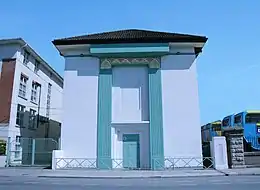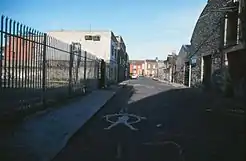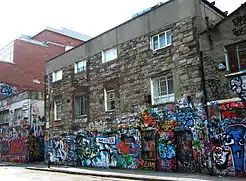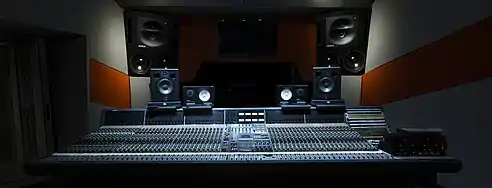Windmill Lane Studios
Windmill Lane Recording Studios (earlier Windmill Lane Studios) is a recording studio in Dublin, Ireland. It was originally opened in 1978 by recording engineer Brian Masterson in premises at 22 Windmill Lane, and it subsequently relocated to its current location in a three-storey building at 20 Ringsend Road, Dublin 4, where it still operates as one of Ireland's largest recording studios.


| |
| Location | 20 Ringsend Road,
Dublin 4, Ireland, D04 CF66 |
|---|---|
| Opened | 1978 |
| Website | |
| http://www.windmilllanerecording.com | |
Over the course of its history, it has been used by many notable artists. The original site of the Windmill Lane Studios remained a popular cult symbol for music fans due to the studio's links with the Irish rock group U2; the group's albums to have been fully or partially recorded there include Boy, October, War, The Joshua Tree, Pop, All That You Can't Leave Behind, and Zooropa.
History of old location
Windmill Lane Recording Studios was originally opened by recording engineer Brian Masterson in 1978, and was first located in the Dublin Docklands on Windmill Lane, just off Sir John Rogerson's Quay. It was originally used to record traditional Irish music, notably by Planxty.[1]:262–267
However, no Irish rock band recorded in the studios until U2.[2] The drums on Boy were recorded in the reception area of the recording studios, due to producer Steve Lillywhite's desire to achieve "this wonderful clattery sound".[2] They had to wait until the receptionist went home in the evenings as the phone rang through the day and even occasionally in the evening.[2]
After U2 based themselves at the studios, Van Morrison, Sinéad O'Connor, and Elvis Costello recorded there. Clannad's hit "Theme from Harry's Game" was also recorded at the studios, and two albums by Status Quo were recorded there in 1980: Just Supposin' and Never Too Late, released in 1981.
The studios were expanded in the 1980s under the supervision of Andy Munro of Munro Acoustics. Much of the work was done specifically for U2's album The Joshua Tree. In 1990 the main studio moved to a new location on Ringsend Road, also in the Docklands.[3]

Following the move, the Windmill Lane building continued to house various post-production facilities.[4] These included Windmill Lane Pictures[5] (a video post-production facility), incorporating Number 4 (an audio post-production facility), Trend Studios (audio mastering) and a number of other related services.
The original studio buildings were covered in graffiti from fans, who had paid pilgrimage from all over the world, many attracted by the studio's historical connection with U2.[4][6] The original location of the studios were recommended as a tourist attraction by publications such as The New York Times in 2008.[6]

The post-production studios at Windmill Lane became the first building in Ireland to buy a Baselight colour grading system on 2 April 2008.[7] The studios have been used for several films, including In America and Get Rich and Die Tryin' directed by Jim Sheridan, and has been used for American films made in Ireland, examples of which include King Arthur and Veronica Guerin.[7]
Plans to construct a six-storey office block on the old site led to criticism from local resident groups in early September 2008.[5]
The Windmill Lane site was then bought by property companies Hibernia REIT in 2015, who announced in 2014 that it had purchased the loans held against the Hanover Building on Windmill Lane, Dublin, for €20.16 million and an adjoining one acre development site for €7.5 million. A plan was made to develop it into offices, retail spaces and residential units.[8]
The original Windmill Lane Studios structure was demolished on 3 April 2015, by property investment company Hibernia REIT, with the exception of Open Gallery 3 where U2 recorded. The firm announced plans to retain a 20-metre stretch of the studio wall famous for its fan graffiti. Options for the future of the wall include recreating the wall in the atrium of the new Windmill Lane building, giving the wall to Dublin City Council, U2 or any other interested party for reconstruction or reuse in an alternative setting. Another possibility is donating the wall to a charity so that they can auction pieces of it to U2 fans around the world.
History of current location

In 1990, Windmill Lane Studios relocated from its original site on Windmill Lane to its current location on Ringsend Road, Dublin 4.[3]
Orchestras regularly record their music at Windmill Lane Recording Studios, as Studio One is the only recording room in Ireland that can record an 80-piece orchestra apart from Raidió Teilifís Éireann.[4] The scores to many movies have been recorded there: Mission Impossible, Syng Street, A Room with a View, The Remains of the Day, The Mask and The Tailor of Panama[4], The Grifters, My Left Foot (both by Elmer Bernstein), In America, and A River Runs Through It.[4]
Studio Two is known for being responsible for a high number of number-one albums, recorded by artists such as Gabrielle, Kylie Minogue and The Spice Girls.[4] Kate Bush partially recorded her 1985 album Hounds of Love at Windmill Lane Studios.[4] The Waterboys recorded their 1988 album Fisherman's Blues at Windmill Lane Studios.[4]
The studio remained empty from 2006 onwards, although reports circulated which linked Van Morrison with purchasing the studio for his own personal use that August.[4][9] Morrison had previously recorded several albums there, including Back on Top, Magic Time and Pay the Devil.[9] In January 2008, the studio was used to record "The Ballad of Ronnie Drew".[10]
In 2009, Dale Entertainments Ltd. took over Windmill Lane Recording Studios and updated the studios. Music of all types and genres continue to be recorded here, from pop and electronic to jazz and classical film scores. A multitude of Grammy Award winning albums hang on the walls of the studios inside. Artists and projects recorded here include : AC/DC, U2, David Bowie, Kate Bush, Riverdance, The Rolling Stones, The Cranberries, Metallica, Depeche Mode, The Commitments, Westlife, The Spice Girls, Lady Gaga, The Jonas Brothers, Van Morrison, Kylie Minogue, The Script, Ed Sheeran, Hozier and many more.
In mid-February 2012, the studio issued an appeal to artists who recorded there to collect their master tapes, stating they will be otherwise be destroyed. The studio noted the tapes, numbering over 1,000 and weighing a tonne, were recorded before digital technology and were both deteriorating and are taking up valuable space.[11][12] Subsequently, all tapes owned by Island Records were recovered by them.[13]
On 20 February 2020, the studio launched a visitor experience. President of Ireland Michael D. Higgins was the guest of honour along with key music industry personalities. Guests were treated to a surprise musical performance by Paul Brady and Donal Lunny in the iconic Studio 1.
References
- O'Toole, Leagues (2006). The Humours of Planxty. Ireland: Hodder Headline. ISBN 0-340-83796-9.
- "U2's producer reveals studio secrets". BBC. 18 July 2008. Retrieved 20 June 2009.
- "About". Windmill Lane Recording Studios. Retrieved 19 April 2017.
- "Ghostly echoes as U2 studio is revived". The Irish Times. 12 June 2009. Retrieved 20 June 2009. Another copy of this article is located here.
- "Seven-storey scheme for SCR Windmill Lane plan appealed". The Irish Times. 4 September 2008. Retrieved 20 June 2009.
- Lenker, George (13 July 2008). "36 Hours in Dublin". The New York Times. Retrieved 20 June 2009.
- "Baselight for Windmill Lane". broadcastnow.co.uk. 2 April 2008. Retrieved 20 June 2009.
- "Property firm to spend €47m on city centre site of U2's former studios - Herald.ie".
- "Van Morrison buys Windmill Lane Studios". Hot Press. 11 August 2006. Retrieved 20 June 2009.
- Richie Taylor (18 January 2008). "Cream of Irish music in tribute to Dubliner as he battles with cancer". Irish Independent. Retrieved 21 August 2009.
- "Legendary Dublin studio issues tape appeal". RTÉ. 27 February 2013. Archived from the original on 16 February 2020. Retrieved 16 February 2020.
- McGreevy, Ronan (28 February 2013). "Lost tapes at Windmill Lane await star owners". The Irish Times. Archived from the original on 16 February 2020. Retrieved 16 February 2020.
- Fanning, Dave (Director) (2 March 2013). Perrey Tony [Perrey from Windmill Lane Studios] (RTÉ 2fm). Dublin: Fanning, Dave.
External links
| Wikimedia Commons has media related to Windmill Lane, Dublin. |
- Official site
- Photos on u2tour.de (includes examples of graffiti)